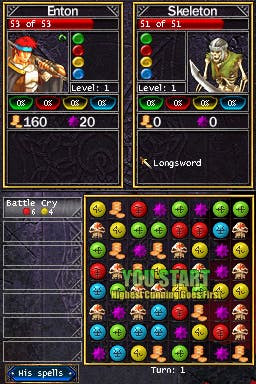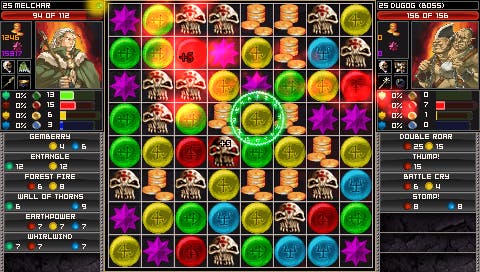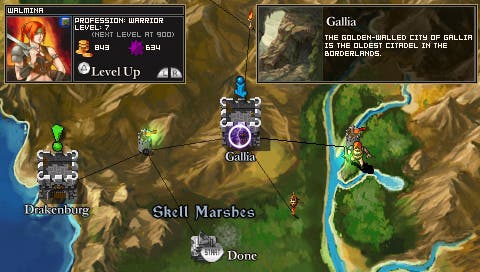Puzzle Quest: Challenge of the Warlords
Heroic effort.
When has never been a problem (5pm) and neither has where (behind the bike sheds), but Man, as befits a creature so indecisive that he invented TiVo, has never really made up his mind about how to settle differences between his brothers and sisters. Thousands of years ago, right up until someone had an eye out, it was swords. Then there was chess, baccarat, happy slapping, parking tickets and flicking rubber bands. Puzzle Quest, in many respects a bog-standard fantasy RPG, doesn't bother with any of that. Instead you swap tiles until someone dies. Punching rats has never been so B&Q.
Playing as one of four characters (druid, wizard, knight, warrior), you're thrust into battles against skeletons, sorcerers, ogres and worse, but instead of smashing each other to bits with the range of swords, clubs and other items that make up your inventory, you take turns to pick your way through rows of different-coloured orbs in search of combinations. Like Bejeweled or Zoo Keeper, the idea is to find two adjacent tiles so that, when swapped, at least one of them contributes to a line of three matching tiles, which then disappear, allowing others to fall into the gap and potentially chain.
By connecting Puzzle Quest's lines of skulls, you can land basic blows that sap your enemy's health. Other tiles are coloured (red, yellow, green and blue) representing mana, which builds up as you match the coloured tiles and allows you to cast spells - some violent, some buffing, some poisonous, some healing, and so on. Experience tiles (purple stars) add to the experience points you pick up after the fight, while gold tiles earn money. This being an RPG, XP and cash help you toward hit points, big tools and wicked hats, and in a neat touch even a lost battle nets you some experience.

None of it's hard to grasp. In fact, the novelty of using a recognisable puzzle mechanic to solve disputes wears off almost immediately, leaving a vacuum into which another interesting thought settles: this actually makes a lot of sense. Resolving conflicts in your average RPG is usually just a matter of picking attacks and casting spells in the right order, so you don't run out of health before the other chap does. Others, like Fire Emblem, are tightrope walks along narrow beams of concentration, where one false move can kill you. The most surprising thing about Puzzle Quest's approach is that nobody thought of doing it before now: it's simple, balanced and meaningful, rather than just a means to an end. The other surprising thing about Puzzle Quest's approach is that you can ride around on a giant rat.
That's because there's more to the game than simply wandering between castles on the world-map, talking to queens and kings and beating up the undead (why won't they just leave it?). There are countless sub-quests that help build up your character's statistics, and flesh out areas of the story that might otherwise go untended. The arresting battle mechanic means your compulsion to explore these strands is similar, again, to Fire Emblem, and indeed it wouldn't be overly unfair to characterise Puzzle Quest's tale of Darkness In The North as a less gobby equivalent.
But back to the giant rats. Between battles and quests, you can pop back to your Citadel and do a bit of DIY. Build a Mage Tower, and you can research the spells that regular opponents have been using against you. Doing so involves playing a Bejeweled-style puzzle on your own, rather than swapping turns with the AI, until you've collected enough of each type of tile to gain the spell. Elsewhere, besting certain enemies a few times allows you to try and capture them during a subsequent encounter. Faced with an arrangement of tiles that takes up only some of the screen, you have to make lines in such a way that all are used up with none left over. Do that and you have a mount. Head back to the Citadel and you can level it up by playing against the AI with time-limited turns, one skill level at a time. Having a good mount helps when you leave the city walls; a half-decent giant rat increases your cunning, which means that you often get to go first in proper fights.

The amount of variables that weigh on each battle's outcome ought to have RPG fans frothing already (if not, the rat's rabid bite will), and that's before we talk about things like item-forging, spell management, the choices you get to make as part of the story, and developing the sort of tactical knowledge that has you shying away from easy lines in case it develops the board for the other player. You certainly shouldn't worry about getting bored of the puzzles, even if you've played Bejeweled or Zoo Keeper so long that you see the tiles when you close your eyes. While both the puzzles and the set-up are fairly well-worn, the way they combine here refreshes the senses, and makes new demands of the player.
Unfortunately there are occasions when you'll feel those demands are too severe, and there's certainly no question that Puzzle Quest is challenging. Being able to redo things without losing progress, or head off and tackle a different quest, is soothing, but the greater problem is the doubt you'll feel about whether the AI is cheating to win. In fairness, the problem's more that luck is an inevitable part of each battle. With tiles descending from the top of the screen to fill gaps, sometimes you're going to benefit and sometimes you're not, and while it's easy to remember the occasions when you felt hard done by (just ask my neighbours, who've heard most of them through the wall), a bit of honest reflection probably recalls enough good luck to balance it out.

Where the game actually falls down is in the way that it sometimes chooses to simulate luck on the AI's part . When you see three skulls in close proximity on the board, and it's possible to make a line out of them and inflict damage, the only reason not to do so is if you have another turn coming up and you want to save them. Usually this is because you can make a line of four or five tiles somewhere else on the screen, which automatically extends your go. What grates is when the AI chooses to complete a line of three relatively benign tiles, which normally would end its turn, after which the tiles that descend from the top of the screen magically form a line of four that ensures it gets to continue, offering another opportunity to line up the skulls. That sort of gamble is simply inhuman, and erodes the trust between game and player.
Fortunately it's something that - a few hissy tantrums and the odd parking ticket aside - the average grown-up will be able to cope with, and there's little else to stop us recommending Puzzle Quest. As to which version, the PSP is the better-looking, but reportedly suffers from a trifling bug that renders your quest companions' skills useless, so you might prefer to play it on the DS, where it looks slightly less exciting, but does offer stylus controls, which mostly work fine. Whichever you opt for, we reckon the score below fits. If you disagree, perhaps we'll see you at the usual time and the usual place, but do remember to bring Puzzle Quest, because it has excellent local wireless multiplayer, and we're out of rubber bands to flick at you.


